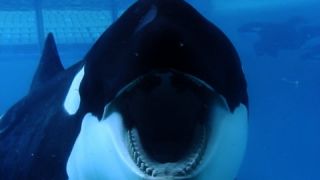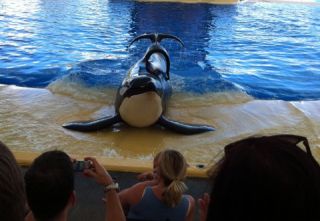Relationships
Shamu the Slut
A Bellwether case study: Will Blackfish blacklist Blackstone?
Posted November 7, 2013
You are at security in an international airport surrounded by throngs of people. Suddenly, a large group of armed personnel storm the area, seizing you and a half dozen other strangers, including children, at gunpoint. You are so terrified you can’t think, can’t breathe. Screaming is everywhere. They crowd each of you into a dark box, tied up so you can‘t move, and put you on a plane. After many hours without food or water, you are deposited onto your new home: a large life raft anchored offshore an island. The others are with you. One or two speak English; the others speak a language you don’t understand. The children are in shock, shaking, unable to speak or look in your eyes. One of the lucky ones has her mother.
In survival mode now, you take note of your surroundings. The raft has a small overhang for shade. But it is surrounded by water infested with sharks and you realize the personnel are intentionally trapping you here, on this raft, with these strangers. It is hard to walk or move and you are exposed to the elements in a way you never have been before. It is impossible to be comfortable. But you want to live. When the personnel come with food, you do what they ask. They teach you to work together, to do comic jumps and leaps—it does look amazing when you manage a cartwheel on this raft. Crowds appear on shore every day to watch you and applaud your prowess. It is the only way to get food. You learn to socialize with the people on the raft who were once strangers. You come to love some, especially the children. But there is no way to avoid the others. There are fights, some brutal. You are almost always sick and your teeth rot. One of you dies when he flings himself to the sharks, desperate to escape. The personnel expect offspring, and force you to mate with the strangers. The children must breed, too. Many of the babies die, the ones who live are often taken from you and you feel horrifying grief. Some of the men are milked for their sperm; they are valuable donors to the breeding program. Eventually, you are forced to mate with one of your own children. The captors who work with you appear to love you, and treat you with care and kindness as much as they can, but you remain trapped on this raft, away from all you knew, your family, your loved ones, your community, your life.
You live here on this raft for thirty years, performing for the crowds every day until your early death.

Orca, of course, would never be seen at an international airport. Instead, they are ripped (and that word is not an understatement) directly from the families with whom they stay for life—wild sons and daughters never leave their mother’s side. The allegory above allows us, as humans, to wrap our mind around what we require highly intelligent and profoundly social cetaceans to do for us. They are forced to be sluts for us. For money. For a lot of money. [The Blackstone Group—which though SeaWorld Entertainment is, as of this year, publically traded—owns a substantial stake in SeaWorld, is the largest alternative investment firm in the world, and it earned 178% on SeaWorld in 3.5 years].
We allow it, in part, because of systemic propaganda and the sophisticated and intentional use of the word Shamu. And it’s happened too often before: Jew, black, Muslim, Indian, woman. Words used to help subjugate and erase worth and personhood.
When we accept the name Shamu, we accept atrocious brutalization of sentient beings that are more highly evolved than we are. Orca brains are enlarged in the limbic system: their emotional life, their social experience, is utterly outside our own comprehension—they very likely experience their families as tight-knit, indivisible entities. The word, Shamu is, at core, a deception misleading us—in precisely the ways the word “slut” misleads us—away from the truth of such an individual’s unique and singular value. It allows us to ignore the real, ongoing, and devastating facts of captive existence: an existence now brought to light by Gabriela Coperthwaite’s (IDA award-nominated and NYTs Critics' Pick) documentary Blackfish and by the riveting expose’ Death at SeaWorld: Shamu and the Dark Side of Killer Whales in Captivity by best-selling author, David Kirby.

I knew when I read Death at SeaWorld last summer that this book was about much more than killer whales. It was about our society, how it’s structured, and the systems we have in place that allow, and even encourage, brutalization of animals, people and the Earth…legal and corporate systems that continue to foster climate change and other instances of severe deterioration of our natural systems. What I didn’t know, then, was that Death at SeaWorld was a bellwether, one of the first in this particular upheaval (see also Blood in the Water in Outside Magazine by journalist and Blackfish co-producer, Tim Zimmerman).
Now, Blackfish is further advancing this powerful shift to a societal awakening, and to incontrovertible demands for justice. CNN’s airing of Blackfish on October 24th (with subsequent encore screenings) swept the ratings, and stock prices at SeaWorld continue to fall after their initial plunge when the movie aired in theaters nationwide in July. Macy’s is feeling the pressure to drop a new SeaWorld float from their Thanksgiving parade. And Newt Gingrich spoke of his disappointment and frustration with SeaWorld and its lack of transparency. Many around the world are calling for the permanent retirement or release for all captive cetaceans, while others, including Jane Goodall, work to prevent the additional importation of wild-caught cetaceans to U.S. aquariums. Just last spring India declared cetaceans non-human persons, banning their captivity permanently.
Importantly, as with so many related stories, without the dedicated work of whale researchers around the world, we'd know next to nothing of the true nature of wild whales, and perhaps, none of this would be happening if it weren't for them. These folks deeply understand that when you save the whales, you save the oceans, and you save people (see this year's World Whale Conference where Kirby is giving the keynote and many others I've noted here are working with epic planetary healing as their goal).
A bellwether is “any entity in a given arena that serves to create or influence trends or to presage future happenings.” The story of captive orca told so well in Blackfish and Death at SeaWorld presages more than cetacean freedom. It foreshadows an urgent global uprising to set things right everywhere. We are seeing an international frenzy for justice.
The morning I woke up after seeing Blackfish for the first time, I noticed myself replaying the faces of the former SeaWorld trainers interviewed in the movie, feeling affection bordering on love for each one of these people. And I realized my love for them arose for their heroism. When our group left the theater after Blackfish, every cheek was wet. Every one of us had been changed. Every one of us, deeply grateful to those former trainers who’d spoken the truth, who told it like it is. That is bravery. To speak, to act, when one’s social group might not accept the truth. Courage—means to come from the heart. When I awoke that next morning, I realized I’d fallen in love, deep in my heart, with their heroism, their bravery, their willingness to share the hardest and most painful experiences of their lives, so that we might learn from them, and then, act too.
When we left the theater, my friend turned to me, the tears still rimming her eyes, and she said, “Rachel, the thing that disturbed me the most was how people can know—right in the moment that it’s happening—that something is so horribly, terribly wrong, and yet do nothing about it. Why do people do that? Deny the truth?”
Why, indeed.
UPDATE November 8: To illustrate the potential of these demands for justice, I learned the day after posting that the chairman of SeaWorld sold off $1.3 million in shares over the last week, while the Wall Street Journal asked yesterday what Blackfish means for SeaWorld and MarketWatch wondered whether SeaWorld will tank after expose in Blackfish.
Blackfish will be available to purchase in the US on November 12. For more on demands for justice inspired by the film, start with Elizabeth Batt's excellent piece at Digital Journal: Bombed by Blackfish, fallout continues for SeaWorld. And if you want to know a little more of who Shamu really is, read this cartoon (double click to enlarge).
Join the Mothering Nature conversation on Facebook and Twitter, and unleash your epic force for harmony on Earth.




